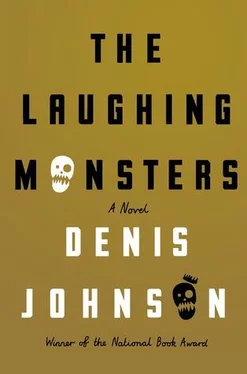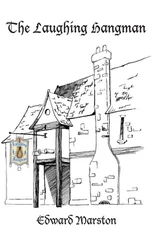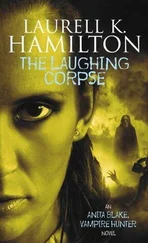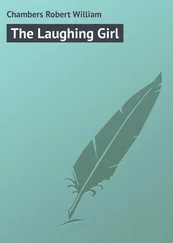While this went on I had the sense to find a kiosk and buy a bag of breadrolls and some candles and matches and two liters of water and a yellow number-two pencil and a small kitchen knife wrapped, for safety’s sake, in newspaper. I paid with a five-thousand-shilling bill, and the proprietor and his wife shuttered their store and went to canvass their neighbors for the balance. They hadn’t returned before the coffin maker set out again.
As far as I know, during the rest of the journey, as much as fifteen kilometers, I believe, the bearer of the coffins took no water. I ate my bread and drank down my two liters and then started dying of the drunkard’s thirst.
I let him blaze the trail into another spell of rain and out again. We entered open farmland. In the mud, the tread-prints of goats and barefoot humans. The wet fields shone hard enough to burn my eyes. We passed boys as they stopped hoeing to throw themselves down in the corn rows with their arms flung wide and their chins in the dirt, praying toward Mecca, but they sounded like coyotes howling. Just afterward, the coffins disappeared over a rise, and when I’d climbed to the top I looked across a landscape of rolling hills and silhouettes — the lumps of huts, a few skeletal, solitary trees, and three cell phone towers with much the same lonely and distinguished aspect, one in the north, two others beyond it in the northwest.
The coffin maker, already free of his cargo, charged back down the way he’d come. I moved to block his way. He skidded to a stop and leaned on his handlebars, tipping his bike to the side with one short leg outstretched and a toe on the ground, and when I asked him if this was Newada Mountain, he spoke his first words to me, saying, “Oui, c’est Newada,” and kicked off again, gaining speed down the hill, and I gathered he’d reach the wider road before full dark. A bit along in his descent he turned his head and spoke once more, calling, “—le lieu du mal!” which I think means the bad or the wrong or the evil place.
* * *
ATTENDEZ EN ANGLAIS:
FINDER PLEASE DELIVER THIS MATERIAL TO
THE UNITED STATES MILITARY GARRISON
NEAR DARBA, CONGO
TO WHOM IT MAY CONCERN (US MILITARY PERSONNEL):
PLEASE FORWARD ATTACHED MATERIAL TO
DAVIDIA ST. CLAIRE
C/O GARRISON CMDR COL. MARCUS ST. CLAIRE
US 10TH SPEC FORCES, FT. CARSON, COLORADO, USA
WITH GRATITUDE — KAPTAJN ROLAND NAIR (CAPT.)
JYDSKE DRAGONREGIMENT, HRN (ROYAL DANISH ARMY)
[OCT 27 ca. 12AM]
Davidia,
I wish I could record this silence. It’s like the bottom of the sea. In silence like this, my head makes its own noise — I can hear the moon, I can hear the stars. Once in a while a sick child croaks in one of the huts.
(I started to write this a couple of hours ago. I lit a candle, but the flame drew the nocturnal insects, including a moth big as a sparrow that batted out the flame in its forays and then crashed at my feet with its paraffin-spattered wings on fire and lay there flailing and burning for several minutes — all because of its infatuation … And then I saw the half moon coming up, so I’ve waited for its light to write by, sitting in the doorway of this hut. I’m guessing as to time of day, but the moon’s been waxing fatter and rising later and I remember it rose around ten pm when last I owned a watch.)
I won’t bother catching you up. Someday I’ll attach this to a full account. I’ll wrap it all in brown paper and tie it with string and plunk it in a DHL pouch addressed to you, or to Tina Huntington. Which of you am I writing to?
To you, Davidia. Just letting you know (should only this fragment reach you) that as of the date above, I was still alive.
For the third time in ten days, I’m a captive — not held by others, but stuck, no option for movement. In my universe, time and space converge on 3 pm Nov 2nd at the Bawarchi Restaurant in Freetown — remember the Bawarchi? — 5000 kilometers and 112 hours from here and now. Not a clue how to get there.
I have some candles and matches, but as I say — the crashing bugs. I’ve got paper and pencils and a knife. The clothes on my back. 720 US dollars. 60K Ugandan shillings. No credit cards or plane tickets, no passport, no documented actuality. No pills against malaria. Every day, more African.
I think when the wind shifts I may be hearing the brook at the bottom of the hill, or people down there laughing, or weeping.
Several hours ago, Davidia, at dusk, I climbed this hill and arrived at the village of New Water Mountain. I stood among a couple dozen huts. No mountain visible. Hooves and feet had beaten the hilltop’s ground into a flat, muddy waste. The only splashes of color came from yellow twenty-liter water jugs — they lay all around. And two bright, child-size purple coffins. Beside the coffins, two old men scraped at the ground, one with a hoe, one with a spade, both men barefoot but wearing long sleeves and trousers.
Nearby, a man and a woman seemed to be taking apart one of the dwellings, removing its thatch, setting the materials aside. The woman stopped, laid her head back, and put her face to the sky — I expected a mournful howl, but she only trembled a bit, then settled her mind, it seemed, and returned to the work.
A giant leafless tree, an arthritic-looking horror, dominates the vicinity from the top of the rise (I can hear it creaking in the breeze right now as I write). Four people stood at the tree’s base, hallooing up toward the highest branches like hounds. One of them, a white woman, met me as I approached, and she said, “Are you wondering where the chickens went?”—I said I wasn’t—“And the goats? They’re all dead. And most of the children. Dead. Are you lost?”—I said a little—“You look disturbed.”—She meant drunk. I said I was.
She’d walked among several villages with these others, two women and a sturdy-looking man with a machete on his shoulder, all Africans. She alone was white — white and plump, probably in her thirties — and grimy from hiking, but hale and upright.
I said, “Jesus, I know you.”
“You know Jesus?”
“I saw you at the White Nile Hotel, didn’t I? You were swimming in the pool.”
“My husband Jim and I are from the North East Congo Mission of the Seventh-day Adventist Church.”
“I had the impression it was something like that.”
“It’s the Lord’s work,” she said, “but every day you want to kill somebody.”
The man with the machete said, “We must go, Mom.”
“I know. I just said so.”
She told me her husband had spent the day in Darba trying to find someone from the Ministry of Health so they could get some action up here. “Or the Red Cross or somebody. What a laugh. But we have to try.”
“What about Doctors Without Borders?”
“He’ll check with them too, but they like to stay close to Bunia for supplies. Close to the airfield. And the brothels. We call them Doctors Without Pants.”
The woman continually waved her hands and flicked her fingers as if battling with cobwebs, and I feared for her sanity as much as mine. She said, “We’ve looked at three other villages in the last two days. It’s the same thing for fifty kilometers around. The people are crazy, the water is poison, everybody’s dying. We’ve convinced them to evacuate — all but this bunch. They’ve got a queen who rules them from the treetop. Come over here and you can look.”
We joined the others. Several meters above us, between two large boughs, a chair was hanging. We could see the bottom of the chair, and a pair of feet, in white tennis shoes, dangling below it, and in the boughs above the chair were bunches of thatch, evidently to protect the owner of the feet.
“She won’t come down till morning, but we can’t wait for that. We’re meeting the reverend in Kananga. It’s two kilometers down that path. Or more.”
Читать дальше












